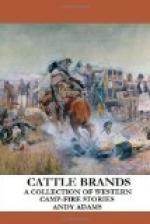As the State advanced, the authorities enlisted small companies of men called Rangers. The citizens’ posse soon gave way to this organized service. The companies, few in number at first, were gradually increased until the State had over a dozen companies in the field. These companies numbered anywhere from ten to sixty men. It can be said with no discredit to the State that there were never half enough companies of men for the work before them.
There was a frontier on the south and west of over two thousand miles to be guarded. A fair specimen of the large things in that State was a shoe-string congressional district, over eleven hundred miles long. To the Ranger, then, is all credit due for guarding this western frontier against the Indians and making life and the possession of property a possibility. On the south was to be met the bandit, the smuggler, and every grade of criminal known to the code.
A generation had come and gone before the Ranger’s work was fairly done. The emergency demanded brave men. They were ready. Not necessarily born to the soil, as a boy the guardian of the frontier was expert in the use of firearms, and in the saddle a tireless rider. As trailers many of them were equal to hounds. In the use of that arbiter of the frontier, the six-shooter, they were artists. As a class, never before or since have their equals in the use of that arm come forward to question this statement.
The average criminal, while familiar with firearms, was as badly handicapped as woman would be against man. The Ranger had no equal. The emergency that produced him no longer existing, he will never have a successor. Any attempt to copy the original would be hopeless imitation. He was shot at at short range oftener than he received his monthly wage. He admired the criminal that would fight, and despised one that would surrender on demand. He would nurse back to life a dead-game man whom his own shot had brought to earth, and give a coward the chance to run any time if he so desired.
He was compelled to lead a life in the open and often descend to the level of the criminal. He had few elements in his makeup, and but a single purpose; but that one purpose—to rid the State of crime—he executed with a vengeance. He was poorly paid for the service rendered. Frequently there was no appropriation with which to pay him; then he lived by rewards and the friendship of ranchmen.
The Ranger always had a fresh horse at his command,—no one thought of refusing him this. Rust-proof, rugged, and tireless, he gave the State protection for life and property. The emergency had produced the man.
“Here, take my glass and throw down on that grove of timber yonder, and notice if there is any sign of animal life to be seen,” said Sergeant “Smoky” C——, addressing “Ramrod,” a private in Company X of the Texas Rangers. The sergeant and the four men had been out on special duty, and now we had halted after an all night’s ride looking for shade and water,—the latter especially. We had two prisoners, (horse-thieves), some extra saddle stock, and three pack mules.




